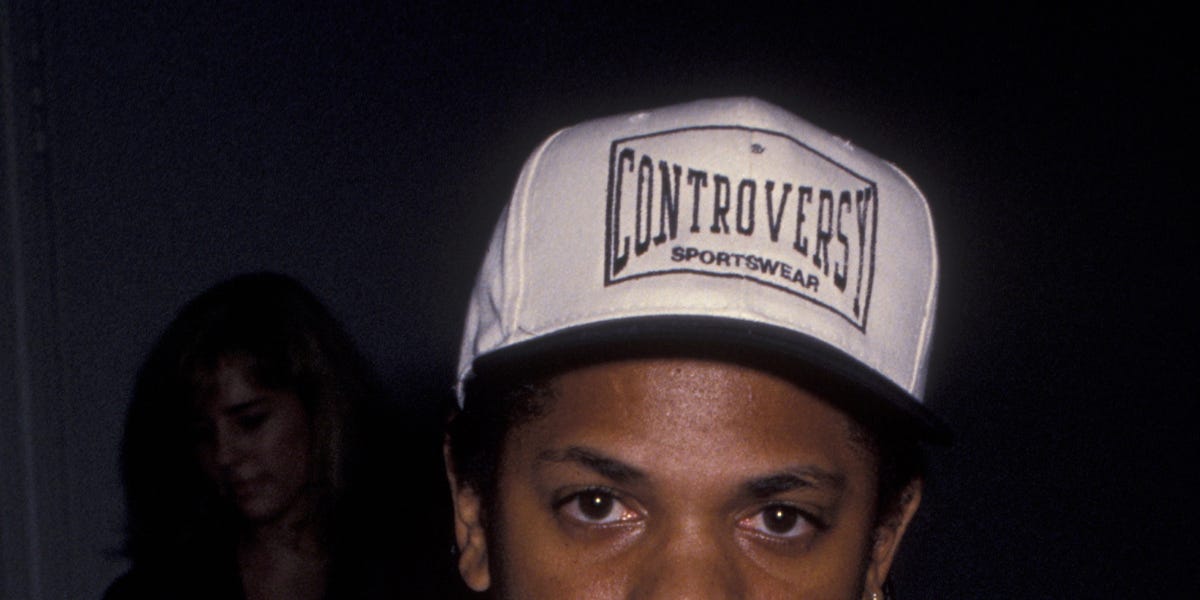Eazy-E wasn’t just a rapper; he was a force of nature who shook the foundations of hip-hop. Born Eric Wright in 1963, his story is one of ambition, talent, and tragedy. He came from Compton, California, a city that would become synonymous with West Coast rap, and his music captured the raw energy and realities of street life there.
Eazy-E’s impact on hip-hop is undeniable. Where is Eazy-E from? He was born and raised in Compton, which became the backdrop for his music and the story of N.W.A. He co-founded Ruthless Records with Jerry Heller, a label that would become a launching pad for some of the biggest names in hip-Hop History. Along with Ice Cube, Dr. Dre, and Mc Ren, he formed N.W.A., a group whose music was both groundbreaking and controversial.
Their debut album, “Straight Outta Compton,” released in 1988, became a cultural phenomenon. When was Eazy-E born? Born in 1963, he rose to prominence alongside the group, becoming known as much for his entrepreneurial spirit as his rapping skills. Their lyrics were raw and unflinching, Addressing Police Brutality, poverty, and gang violence, which sparked both praise and outrage. Despite internal conflicts and legal battles, N.W.A.’s impact on hip-hop was undeniable, paving the way for a new generation of artists.
The Rise of Ruthless Records and N.w.a
Eazy-E’s vision extended beyond just making music; he wanted to build a platform for artists from his community. This led him to co-found Ruthless Records with Jerry Heller in 1986. Ruthless became more than just a label; it was a symbol of West Coast hip-hop, a space where raw talent could flourish and voices that were often ignored could be heard. He saw the potential in artists like Ice Cube and Dr. Dre, recognizing their skills and bringing them together under the Ruthless banner.
The formation of N.W.A. marked a turning point for both Eazy-E and Ruthless Records. This group wasn’T Just About Making Music; they were about representing the realities of life in Compton, the struggles, the anger, and the hope that existed within Its Streets. Their lyrics were unapologetically honest, addressing issues like police brutality and Systemic Racism, which resonated with a generation who Felt Unheard.
N.W.A.’S Debut Album, “Straight Outta Compton,” released in 1988, became an instant success, selling millions of copies and catapulting them to the forefront of the hip-Hop Scene. The album’s controversial lyrics sparked both praise and outrage, drawing attention from the Fbi and igniting a national debate about censorship and freedom of speech. Ruthless Records had become a force to be reckoned with, and Eazy-e was at the helm, guiding his label and artists towards Unprecedented Success.
Straight Outta Compton: A Controversial Debut
In 1988, N.W.A. Released Their Debut Album, “Straight Outta Compton,” and the world took notice. This wasn’T Just Another hip-Hop Record; it was a sonic explosion that captured the raw energy and unflinching realities of life in Compton. The album’s title itself became synonymous with West Coast rap, a declaration of origin and authenticity that resonated deeply with listeners.
Every track on “Straight Outta Compton” felt like a punch to the gut. Lyrics about police brutality, Gang Violence, and societal inequalities were delivered with a raw intensity that was both captivating and unsettling. Songs like “Fuck tha Police” became anthems for a generation feeling marginalized and unheard. The album’s unapologetic honesty pushed boundaries and sparked controversy, drawing criticism from some quarters while simultaneously garnering praise for its unflinching portrayal of social issues.
The impact of “Straight Outta Compton” was immediate and profound. It went double-platinum, becoming a cultural phenomenon that transcended music. It ignited conversations about race, class, and the role of art in Reflecting Societal Realities. The album’s success cemented N.W.A.’s place in hip-Hop History, while also catapulting Ruthless Records to New Heights, solidifying Eazy-e’s position as a visionary leader within the burgeoning West Coast scene.
 Elton John and Bernie Taupin Relationship: A Songwriting Legacy
Elton John and Bernie Taupin Relationship: A Songwriting LegacySolo Career And Internal Conflicts
While Eazy-E found immense success with N.W.A., he also pursued a successful solo career. He released several albums that charted well and further solidified his position as a hip-Hop Heavyweight. His solo work often explored themes similar to those addressed in N.W.A.’S Music, but with a more personal touch, showcasing his growth as an artist and individual.
However, the internal dynamics within N.W.A. Became Increasingly Strained. Creative differences, Personality Clashes, and financial disputes led to tension Between Members, ultimately contributing to the group’s disbandment in the early 1990s. Despite these challenges, Eazy-E remained committed to Ruthless Records, continuing to nurture new talent and seeking out fresh voices within the hip-Hop Scene.
Even as N.W.A. fractured, Eazy-E’s influence on hip-Hop Continued To Grow. He became a key figure in shaping the sound of West Coast rap, inspiring countless artists who followed in His Footsteps. His legacy transcended music; he was a symbol of entrepreneurial spirit, a testament to the power of self-belief and determination, proving that even amidst adversity, one could rise from humble beginnings To Achieve Extraordinary Success.
Eazy-E’s Legacy in Hip-Hop
Eazy-E’s impact on hip-hop is undeniable. Though his life was tragically cut short at the age of 31 in 1995 after revealing his AIDS diagnosis, his legacy continues to resonate throughout the genre and beyond. He wasn’t just a rapper; he was a visionary who helped shape the sound and culture of West Coast hip-hop, paving the way for countless artists who followed in his footsteps.
His music remains influential, with its raw honesty and unflinching portrayal of social realities continuing to inspire and provoke listeners today. Eazy-E’S Entrepreneurial Spirit, evident in his dedication to Ruthless Records and his commitment to nurturing New Talent, left a lasting mark on the industry. He proved that it was possible to achieve success through hard work, determination, and a genuine passion for music.
Ultimately, Eazy-E’s legacy is one of innovation, authenticity, and social consciousness. He used his platform to give voice to the marginalized, Challenge Societal Norms, and push the boundaries of artistic expression. His story serves as a reminder that even in the face of adversity, it is possible to leave an enduring mark on the world through creativity, perseverance, and a commitment to making a difference.
The Impact of a Shortened Life
Eazy-E’s life was tragically cut short at the young age of 31 when he succumbed to complications from AIDS in 1995. His untimely death sent shockwaves through the hip-hop world and beyond, leaving behind a void that could never be filled. It served as a poignant reminder of the fragility of life and the immense impact one individual can have on the world, even within a relatively short timeframe.
Despite his shortened life, Eazy-e’s Contributions To Music, culture, and society continue to reverberate today. His legacy serves as an inspiration to countless artists and entrepreneurs alike, demonstrating the power of vision, determination, and unwavering passion. His story reminds us that it is not always about the length of our lives, but rather the depth of our impact and the enduring influence we Leave Behind.
Eazy-e’s passing also highlighted the devastating effects of the AIDS epidemic, Particularly Within Marginalized Communities. His openness about his diagnosis helped to destigmatize the disease and encouraged Conversations Around HIV/AIDS awareness and prevention. Although his life was tragically cut short, Eazy-e’s legacy extends far beyond music; it encompasses a message of resilience, Social Consciousness, and the importance of using one’s platform to make a difference in the world.










